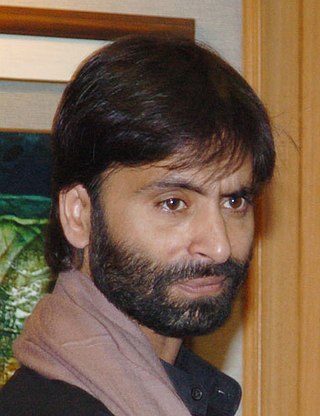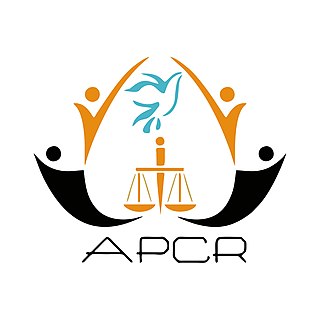Related Research Articles

Bijbehara (Urdu pronunciation:[biːd͡ʒbɪɦɑːɽɑː], known as Vejibror in Kashmiri, is a town and a notified area committee in Anantnag district of the Indian administered union territory of Jammu and Kashmir. It is located on NH 44, and jehlum bank. Bijbehara town is also known as "Town of Chinars" because of a number of Chinars there especially two Chinar gardens. Bijbehara is the home to oldest chinar tree in the region. The town is situated about 45 km from the summer capital of union territory of Jammu and Kashmir, Srinagar.

Yasin Malik is a Kashmiri separatist leader and former militant who advocates the separation of Kashmir from both India and Pakistan. He is the chairman of the Jammu Kashmir Liberation Front, which originally spearheaded armed militancy in the Kashmir Valley. Malik renounced violence in 1994 and adopted peaceful methods to come to a settlement of the Kashmir conflict. In May 2022, Malik pleaded guilty to charges of criminal conspiracy and waging war against the state, and was sentenced to life imprisonment.
The Unlawful Activities (Prevention) Act is an Indian law aimed at the prevention of unlawful activities associations in India. Its main objective was to make powers available for dealing with activities directed against the integrity and sovereignty of India. The most recent amendment of the law, the Unlawful Activities (Prevention) Amendment Act, 2019 has made it possible for the Union Government to designate individuals as terrorists without following any formal judicial process. UAPA is also known as the "Anti-terror law".

The National Investigation Agency (NIA) is a law enforcement agency in India, with specific focus on counter-terrorism. It is under the Ministry of Home Affairs. The primary mandate of the agency is to investigate and prosecute offences that have national and cross-border implications, specifically focusing on terrorism, insurgency, and other related matters. It is empowered to investigate cases that involve threats to the sovereignty, security, and integrity of India.
Parvez Imroz is a Kashmiri human rights lawyer and a civil rights activist in Srinagar, the summer capital of the Jammu and Kashmir, India.
Human rights abuses in Jammu and Kashmir range from mass killings, enforced disappearances, torture, rape and sexual abuse to political repression and suppression of freedom of speech. The Indian Army, Central Reserve Police Force (CRPF), and Border Security Personnel (BSF) have been accused of committing severe human rights abuses against Kashmiri civilians. According to Seema Kazi, militant groups have also been held responsible for similar crimes, but the vast majority of abuses have been perpetrated by the armed forces of the Indian government.
Human rights abuses in Kashmir have been perpetrated by various belligerents in the territories controlled by both India and Pakistan since the two countries' conflict over the region began with their first war in 1947–1948, shortly after the partition of British India. The organized breaches of fundamental human rights in Kashmir are tied to the contested territorial status of the region, over which India and Pakistan have fought multiple wars. More specifically, the issue pertains to abuses committed in Indian-administered Kashmir and in Pakistani-administered Kashmir.

Sheikh Abdul Rashid, better known as Engineer Rashid, is a Kashmiri politician, and currently member of Lok Sabha representing Baramulla constituency in Jammu and Kashmir, India. He was released on interim bail to do campaigning during the assembly elections.
Farooq Ahmed Dar known by his nom de guerre Bitta Karate, is an Indian Kashmiri militant, who currently serves as the chairman of the Jammu Kashmir Liberation Front (R) in the Kashmir Valley of Jammu and Kashmir, India.

The 2016 Kashmir Riots, also known as the Burhan aftermath, refers to protests in the Indian state of Jammu and Kashmir, chiefly in the Kashmir Valley. It started after the killing of militant leader Burhan Wani by Indian security forces on 8 July 2016. Wani was a commander of the Kashmir-based Islamist militant organisation Hizbul Mujahideen.

Khurram Parvez is a Kashmiri human rights activist. He is the chairperson of Asian Federation Against Involuntary Disappearances (AFAD) and the program coordinator of Jammu Kashmir Coalition of Civil Society. Khurram is a recipient of the 2006 Reebok Human Rights Award. Parvez was included in Time's annual list of the 100 most influential people in 2022.
Kamran Yusuf, also known as Kamran Yousuf is a Kashmiri multimedia journalist. As of 2022, Kamran is a staffer at NewsClick. He also works as a freelance multimedia journalist for various international organisations. In 2017, he was booked under UAPA and lodged at Tihar Jail. Many organisations including Committee to Protect Journalists, the International Federation of Journalists, Amnesty International and more issued statements for his immediate release. He got bail after six months and was discharged from all the charges on 16 March 2022 by Delhi court.

Media in Jammu and Kashmir comprises a diverse landscape of print, electronic and digital media outlets. The region is served by a variety of newspapers, television channels, radio stations, and online news platforms, reflecting the cultural and linguistic diversity of the area.

The Jammu and Kashmir Reorganisation Act, 2019 is an act of the parliament of India containing provisions to reconstitute the state of Jammu and Kashmir into two union territories (UTs) called Jammu and Kashmir, and Ladakh, and becoming effective on 31 October 2019. A bill for the act was introduced by the Minister of Home Affairs, Amit Shah, in the Rajya Sabha on 5 August 2019 and was passed on the same day. It was then passed by the Lok Sabha on 6 August 2019 and it received the president's assent on 9 August 2019.

Asif Sultan, also known as Aasif Sultan, is a Kashmiri journalist who has been jailed by India since August 2018. On October 17, 2019, Sultan received the annual John Aubuchon Press Freedom Award by the National Press Club of America. In April 2022, Aasif was granted bail but not released, instead he was re-arrested and booked under the Public Safety Act.
Fahad Shah is an Indian journalist from Srinagar, Jammu and Kashmir. He is the founder and editor of the news magazine The Kashmir Walla. He was a recipient of a Human Rights Press Award in 2021.

Association for Protection of Civil Rights is a non-governmental organization which was established in 2006 for the protection of human rights of the exploited-deprived sections of the society. It is composed of advocate, social activities and grassroots paralegal social workers.

Waheed ur Rehman Para is an Indian politician of Jammu and Kashmir People's Democratic Party and member of the Jammu and Kashmir Legislative Assembly (MLA) representing Pulwama constituency. He is also the legislative party leader of the Jammu and Kashmir People's Democratic Party in J&K assembly.
AasiaJeelani (1974–2004) was a Kashmiri journalist and human rights activist. After completing her studies in Srinagar, Kashmir, she worked for Agence France Presse (AFP) and then the Times of India. She set up the Association of Parents of Disappeared Persons (APDP) and the Kashmiri Women's Initiative for Peace and Disarmament (KWIPD), editing the latter's newsletter. On 20 April 2004, Jeelani and other activists were monitoring elections when the car she was travelling in was blown up by an improvised explosive device and she was killed. She is remembered as a pioneering feminist journalist.
References
- ↑ "NIA court takes cognisance in alleged terror-funding case against human rights defender Irfan Mehraj – The Leaflet". theleaflet.in. 2023-10-11. Retrieved 2024-01-27.
- 1 2 "India arrests Kashmiri journalist amid ongoing media crackdown". Al Jazeera . 2023-03-21. Archived from the original on 2024-04-13. Retrieved 2024-09-27.
- ↑ "Kashmiri freelance journalist arrested by NIA worked with human rights group JKCCS". The Indian Express. 2023-03-21. Retrieved 2024-01-27.
- ↑ "The Work of Irfan Mehraj, a Fearless Journalist Who Offered Fresh Perspectives on Kashmir". The Wire. Retrieved 2024-01-27.
- ↑ "NIA Arrests Kashmiri Journalist Irfan Mehraj in Case Related to Alleged 'Terror Funding' by NGO". NewsClick. 2023-03-21. Retrieved 2024-01-27.
- ↑ PTI. "NGO terror funding case: Court sends Khurram Parvez, Irfan Mehraj to 10-day NIA custody". Deccan Herald. Retrieved 2024-01-27.
- ↑ "NIA arrests Kashmir journalist in 'terror funding' case". Newslaundry . 2023-03-21. Retrieved 2024-01-27.
- ↑ "Asked to stop by "for five minutes," Kashmiri reporter now facing possible life imprisonment | RSF". rsf.org. 2023-03-22. Retrieved 2024-01-27.
- ↑ "Court sends Irfan Mehraj to 10-day NIA custody". Muslim Mirror . 2023-03-22. Retrieved 2024-01-27.
- ↑ "NIA arrests Kashmir journalist in terror funding case, Mehbooba Mufti reacts". India Today. 21 March 2023. Retrieved 2024-01-27.
- ↑ "Irfan Mehraj". USCIRF . Archived from the original on 2023-11-23. Retrieved 2024-09-27.
- ↑ "India: Immediately release Irfan Mehraj – A call from civil society on the first anniversary of his continuing arbitrary detention". Amnesty International . 2024-03-20. Archived from the original on 2024-09-27. Retrieved 2024-09-27.
- ↑ "India: arrest & detention of Kashmiri human rights defenders Irfan Mehraj & Khurram Parvez (joint communication)". UN SR Human Rights Defenders. 2023-08-09. Archived from the original on 2024-08-19. Retrieved 2024-09-27.
- ↑ "India: UN expert demands immediate end to crackdown on Kashmiri human rights defenders (Press Release)". UN SR Human Rights Defenders. 2023-03-24. Archived from the original on 2024-09-19. Retrieved 2024-09-27.
- ↑ "Kashmiri journalist Irfan Mehraj held under UAPA". The Siasat Daily . 2023-03-21. Retrieved 2024-01-27.
- ↑ "India: Authorities must immediately release Kashmiri journalist Irfan Mehraj". Amnesty International. 2023-03-21. Retrieved 2024-01-27.
- ↑ "इरफान मेहराज को NIA ने किया गिरफ्तार, पत्रकार संस्थाओं ने की आलोचना". www.satyahindi.com. Retrieved 2024-01-27.
- ↑ Admin (2024-08-26). "Free Press Kashmir: Jailed Kashmiri journalist among 3 honoured for best story on heroin crisis in JK". HRRFJ Awards. Retrieved 2024-08-29.